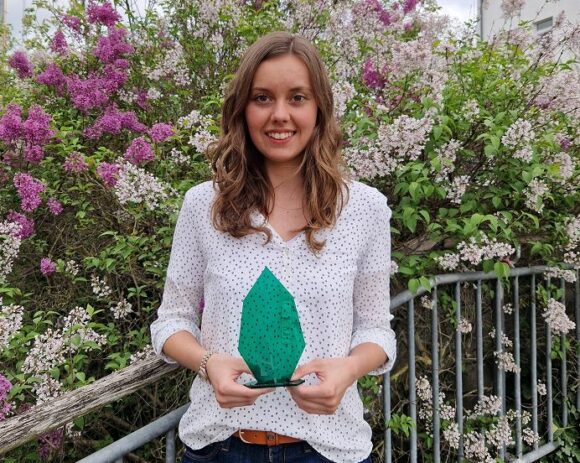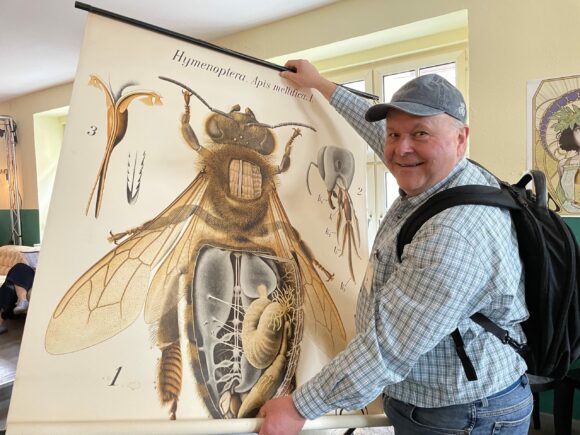The Climate Protection Act has enshrined greenhouse gas neutrality for Germany by 2045. Emissions are to be reduced by 65 percent by 2030 compared with 1990. There is a great need for action here, especially for industry. However, in many companies there is little knowledge about which emissions are generated along the entire value chain, especially outside their own company.

The EU’s ESG (Environmental, Social, Governance) requirements also call for transparency in data use and resource utilization in the future.
In the “CLiCE-DiPP” (Climate-neutral circular economy enabled by Digital Product Carbon Passport) project funded by the German Federal Ministry of Economics and Climate Protection, solutions are now to be developed with the participation of Hof University of Applied Sciences that promise a potential reduction in greenhouse gas emissions of 40 percent. The project aims to develop a digital CO2 product passport that contains all relevant sustainability and energy data across companies, using the metal industry as an example.
The digital product passport should not only provide information on the respective product-specific CO2 footprint, but also make it possible to optimize the production process from the point of view of energy and resource consumption – and this across the entire value chain.
Production plants equipped with sensors
This requires extensive monitoring of the relevant production facilities, which is why they are equipped with appropriate sensor technology. If this is not possible, the necessary data is obtained from the Manufacturing Execution or Enterprise Resource Planning (ERP) systems in order to enable a cause-centric determination of the PCF.
In the CliCE-DiPP project, digital assistance systems for circular economy are created to achieve energy-efficient overall plant effectiveness. In addition, assistance tools are being developed to sensitize employees to the topic of sustainability and to energy- and resource-efficient store floor management. Demonstrators will be used to prove that the actual carbon footprint can be determined from machine data. The aim is to ensure that all companies involved in value creation are able to store the information required to determine the PCF in the Asset Administration Shell.
Theoretical findings for real-world application
The assistance systems and demonstrators are first piloted and validated in the learning factories of the scientific institutes and then transferred to real application scenarios at the application companies. The cross-industry selection of application partners in the consortium, who take on different roles along the supply chain, ensures the transferability of the solution to other industries and sectors.
“A link between digital product passport, CO2 balancing and the control as well as planning of the circular economy has not been investigated in this way before,” Andreas Görmer, Director Research at project coordinator Software AG, emphasizes the unique selling point of CLiCE-DiPP. And further:
“The CO2 Product Passport creates transparency and makes ecological and economic sustainability measurable with digital technologies.”
Andreas Görmer, Director Research Software AG
Software AG fulfills two central tasks in CliCE-DiPP in addition to its role as consortium leader: First, it will connect data sources to the digital CO2 product passport based on its Cumulocity IoT platform, among other things. Second, it will use ARIS Process Mining to identify opportunities for CO2 savings in the value chain. Software AG will also be involved in the development of the data model for the digital CO2 product passport.
Hof University of Applied Sciences ensures transparency
The “Law in Sustainability, Compliance and IT” research group at Hof University of Applied Sciences will ensure the legally compliant use of data for the digital CO2 product passport in the “Data Governance” sub-project. Here, the legal requirements for sustainability of products and processes, for transparency and for the information of stakeholders in the developing legal framework will be recorded, checked for coherence and contradictions and transferred to the data governance model for the digital CO2 product passport.
On this basis, the business model architectures developed in CLiCE-DiPP for the use of sustainability data and the CE will be legally evaluated and recommended or adapted for implementation.”
Prof. Dr. Beatrix Weber, Research Group Leader Hof University of Applied Sciences

Hof University of Applied Sciences to the research project “CliCE-DiPP”;
image: Hof University of Applied Sciences;
Funding and duration
CLiCE-DiPP has a duration of three years. The project is funded by the German Federal Ministry of Economics and Climate Protection as part of the “GreenTech Innovation Competition”.
Research partners are:
- BRUNATA-METRONA GmbH & Co. KG
- Festo SE & Co. KG
- KIT – wbk Institute for Production Engineering, Technology and Machine Tools
- Lorenz GmbH & Co.KG
- Protektorwerk Florenz Maisch GmbH & Co. KG
- Software AG and
- Darmstadt University of Technology, Institute for Production Management, Technology
and Machine Tools (PTW).








